Travel advice for Greece
From travel safety to visa requirements, discover the best tips for visiting Greece
Book your individual trip, stress-free with local travel experts
Generally, the best time to visit Greece is outside the mid-July to end of August peak season, when soaring temperatures, plus crowds of foreigners and locals alike, can be overpowering. Top of the list of most people’s must haves is sunshine and warmth, which you’ll get in abundance from mid-April, and even during the fall months.
If anything is God-given to the Greeks, it’s their Mediterranean climate. From spring to fall, most of Greece enjoys endless sunshine and clear skies, making it a dream destination for outdoor adventures.
If your trip planning to Greece includes winter travel, expect cooler temperatures and occasional rain, with snowfall in the mountains. For the mildest winter weather, head to Rhodes or southeastern Crete, where the climate stays relatively warm year-round.
Spring slowly warms up from March and, although April is still uncertain, it’s superb for wild flowers and green landscapes. By May the weather is more settled and predictable, and Crete, the Peloponnese, the Ionian islands, such as Cephalonia (Kefaloniá) and the Cyclades are perhaps at their best, even if the sea is still a little cool for swimming.
Comfortable temperatures make this the best time to go to Greece for sightseeing, such as in Athens, before the high heat of summer can make wandering archaeological sites more of an ordeal. Delphi, too, 175km northwest of Athens, should be on your itinerary. Flanked by the towering peaks of Mount Parnassós it’s a stunning spectacle, especially with the wildflowers carpeting the valley. You’ll also meet fewer tourists on your hike around the ancient ruins at this time of year.
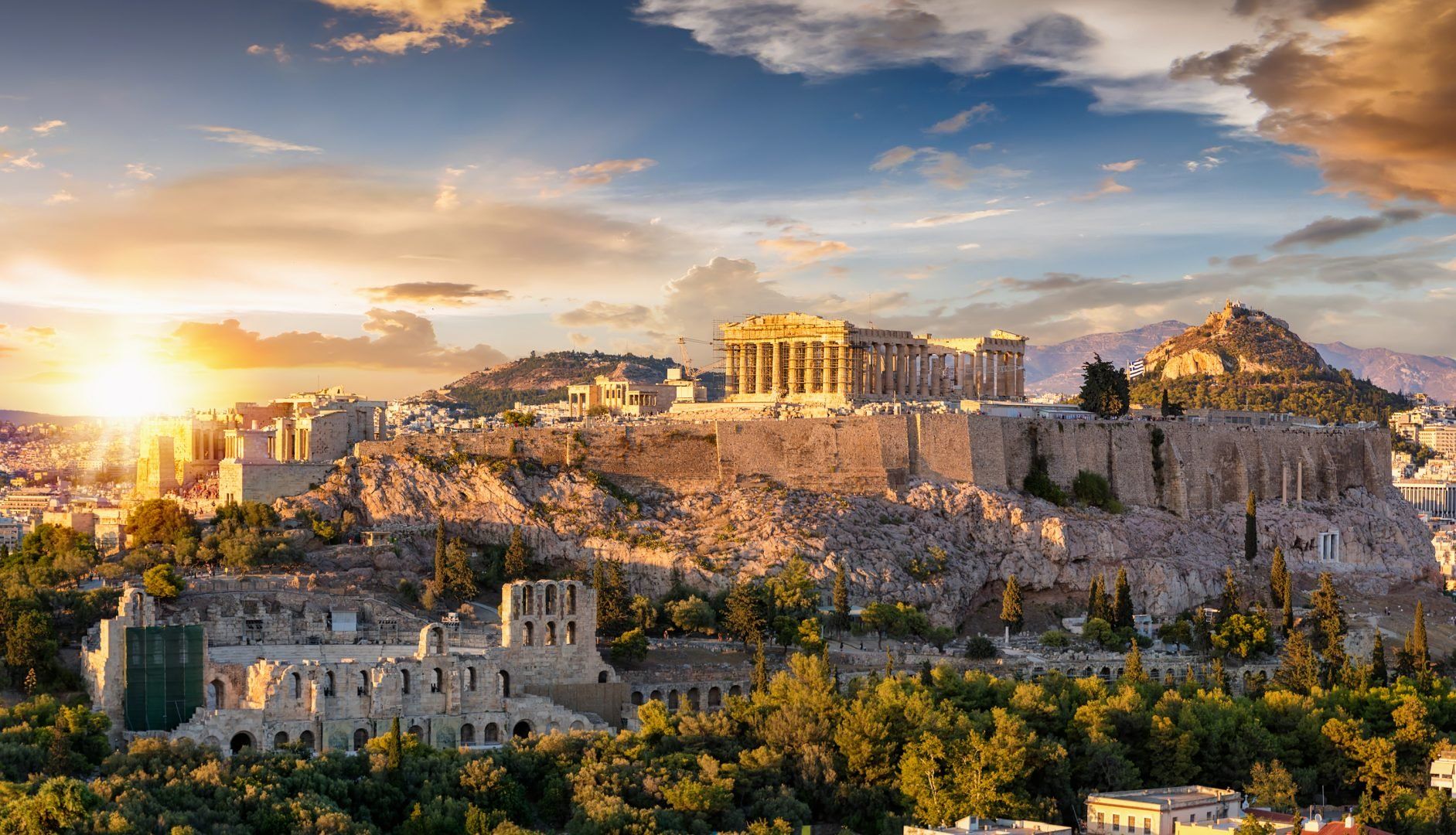
The Acropolis, Athens © Shutterrstock
Springtime (along with fall) is the best time to visit Greece for hiking. There are no shortage of fantastic trails, for example, the Menalon trail, on the Peloponnese peninsula. If you’re northwest on the mainland, head for the Zagorohoria and the Viko Gorge in the Píndhos Mountains. The Meteora region, with its monasteries preposterously perched atop sheer rocky pinnacles, is a popular choice, as are the lovely wooded trails on the mountainous slopes of the Pelion Peninsula. Of the Greek Islands, Crete, in particular the Samaria Gorge, is probably the best known for hiking opportunities. It’s also great for bird watching in spring, along with the Eastern Aegean island of Lesvos and Tílos of the Dodecanese.
Easter is big news in Greece. It is an excellent time to be there, both for the beautiful and moving religious ceremonies and for the days of feasting and celebration which follow. If you make for a smallish village, you may well find yourself an honorary member for the period of the festival. Bear in mind that the Orthodox Easter can fall three weeks either side of the Western festival. Also, this is a busy time for Greek tourists as well as international ones, which means a hike in prices – and you’ll certainly need to book ahead.
If you’re in Greece on the May Day vacation (May 1st) do as the Greeks – pack up a picnic and head for the countryside. Families get together to fly kites and gather the pretty wildflowers, which they make into wreaths for their front doors. These mark the end of spring and welcome the first hints of summer.
By the end of May you’ll find most of the ferry companies gearing up for the summer and opening up their routes to the islands, after the reduced winter and spring services. So if you’re wondering when is the best time to go to Greece for that ideal combination of warm weather, relatively few visitors and the option to island hop, this check marks the boxes.
With temperatures soaring to an uncomfortable 30°C, you may want to give mid-summer a miss if you can, unless you’re always within plunging distance of the sea for regular cooling off sessions. Athens is difficult to take on in high heat and many restaurants shut up store in August. That said, there is a trade off: with most people heading for the coast, there’s less traffic in the city and fewer people taking in the sites.
Ready to explore Greece? Get started with our expert travel planning tips.
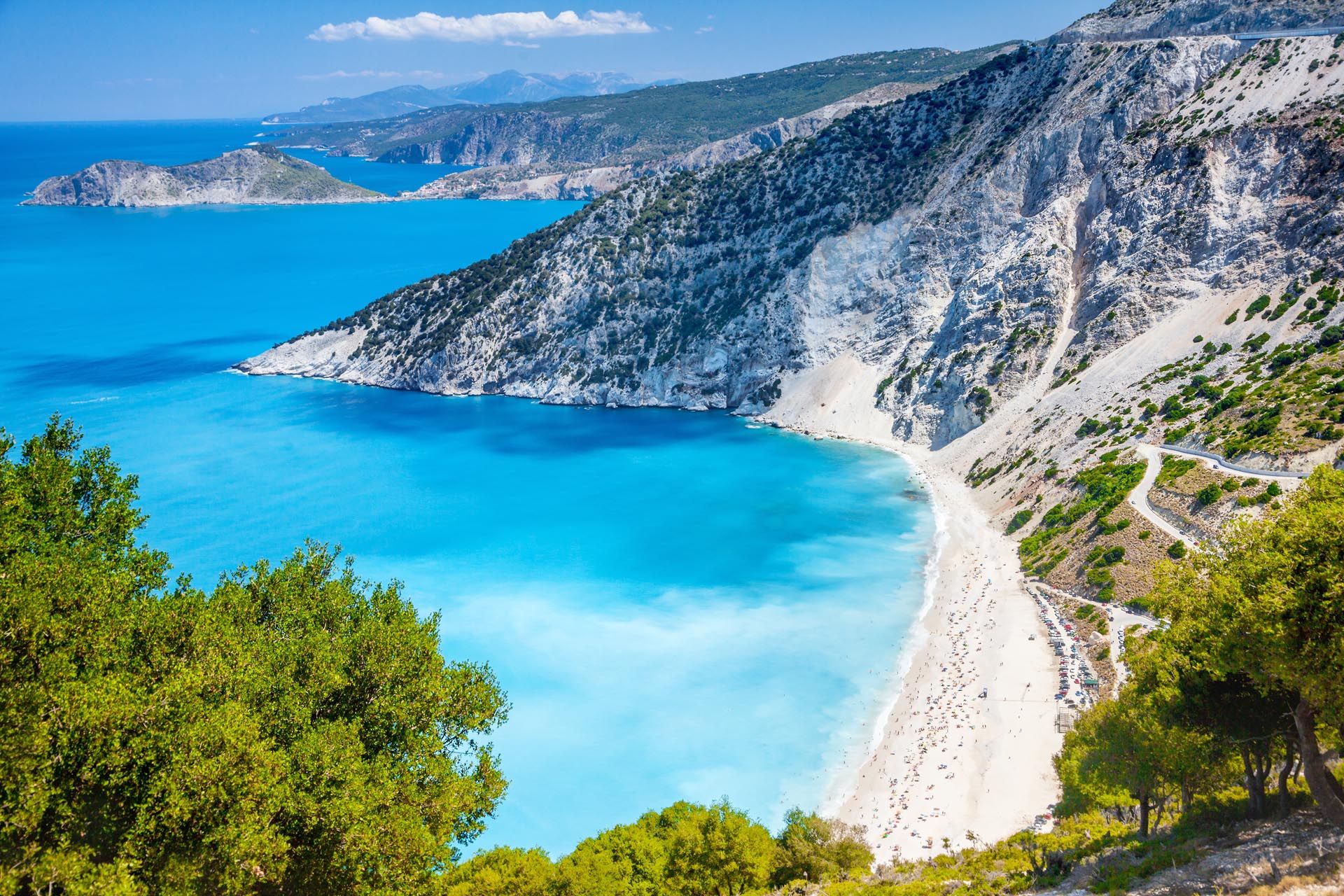
Myrtos beach, Cephalonia © Shutterstock
Also, if you’re in Athens during August, you can take advantage of the free Full Moon Festival events hosted at numerous archaeological sites and museums across the city. These include dance and theatrical performances, film screenings and concerts, with many cultural sites staying open until late. Seeing the Acropolis lit up from within, with the full moon as a backdrop, is particularly stunning. In fact, there are numerous festivals of music, theater and dance happening in the summer months, across Greece. Read our festivals section for details.
The islands are busy during the summer months. For warm weather everywhere without the hordes, the best time to visit Greece is outside of July and August. The Meltemi winds can also affect your vacation. Being blasted by these seasonal winds that hit the Aegean during the summer can certainly take the shine off a day’s sunbathing. Islands of the Cyclades, such as Mykonos, Naxos and Santorini are affected, and Andhros and Tínos really bear the brunt of the gusts. However, the winds can take the edge off the scorching heat.
It’s worth mentioning too that service standards occasionally slip under peak season pressure and room prices on the islands can rocket. If you can only visit during midsummer, it is wise to reserve a package well in advance, buy any ferry tickets beforehand or plan your itinerary off the beaten track. You might choose, for instance, to explore the less obvious parts of the Peloponnese and the northern mainland, or island-hop with an eye for the more remote, or less popular places, such as Serifos and Sikinos in the Cyclades, Karpathos and Astypalea in the Dodecanese.
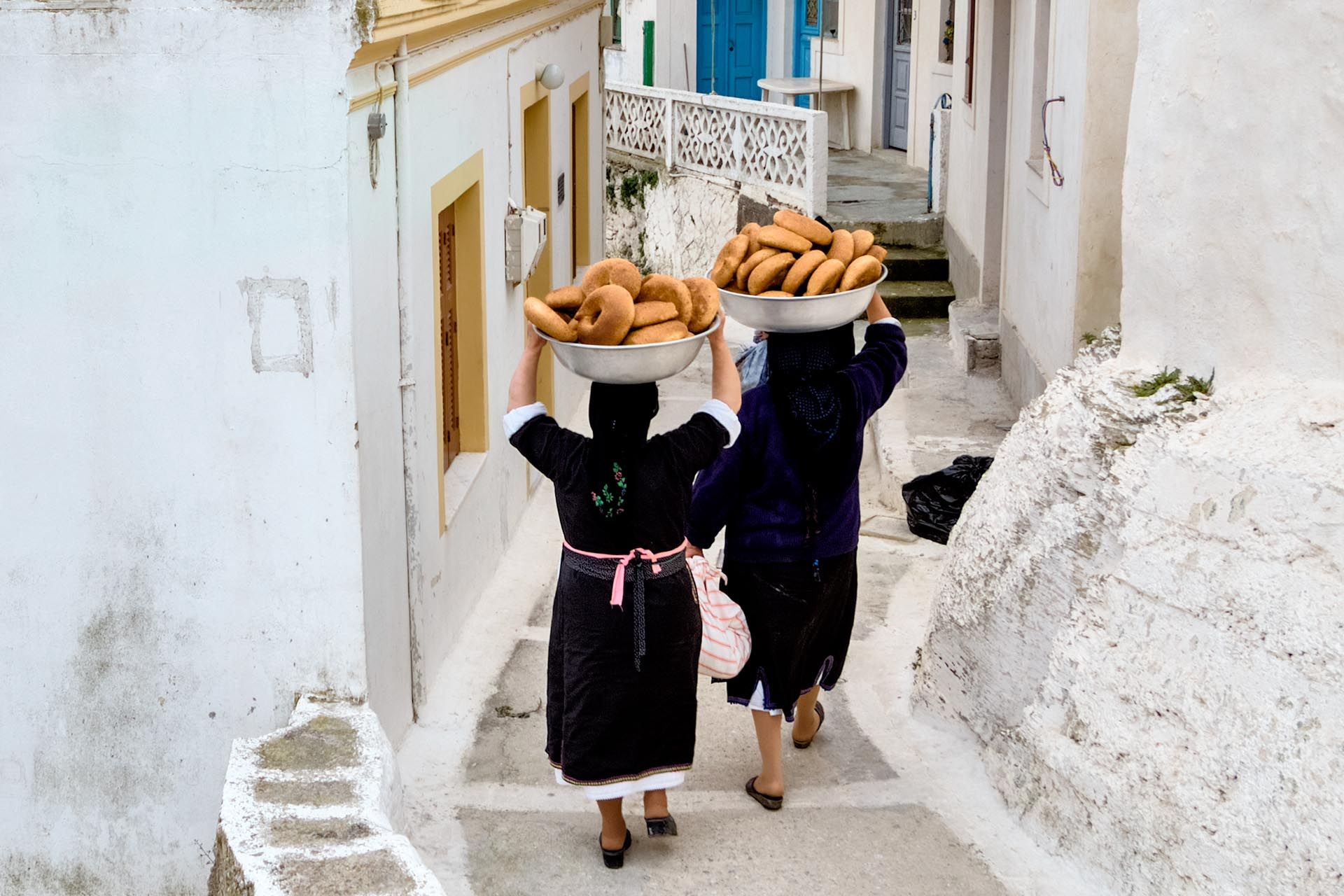
Karpathos island © Shutterstock
If you’re looking to party, though, the nightlife on some of the islands, such as Skiathos (the Sporades) and Mykanos (The Cyclades), really kicks off in July and August. Clubs are buzzing, with top notch DJs taking to the decks.
Fall in general is beautiful. The light is softer, the sea often balmier than the air and the colors subtler. It's also when towns and villages go back to their workaday states – a refreshing change from the gloss of summer tourism.
Come September it's already less busy and the sea is at its warmest, having had the whole summer to warm up. This is maybe the best month to visit Greece if you want a bit of everything from your trip. You can kick back on the beach (certainly no shortage of these), take a dip in the sea, go hiking – and pack in some sightseeing without breaking too much of a sweat. September is also ideal for climbing ‘home of the gods’, Mount Olympus. Pack your walking trunks and set aside a few days for the trek, staying at one of the mountain refuges overnight. If that sounds too strenuous, you can take gentler rambles on the forested lower slopes.
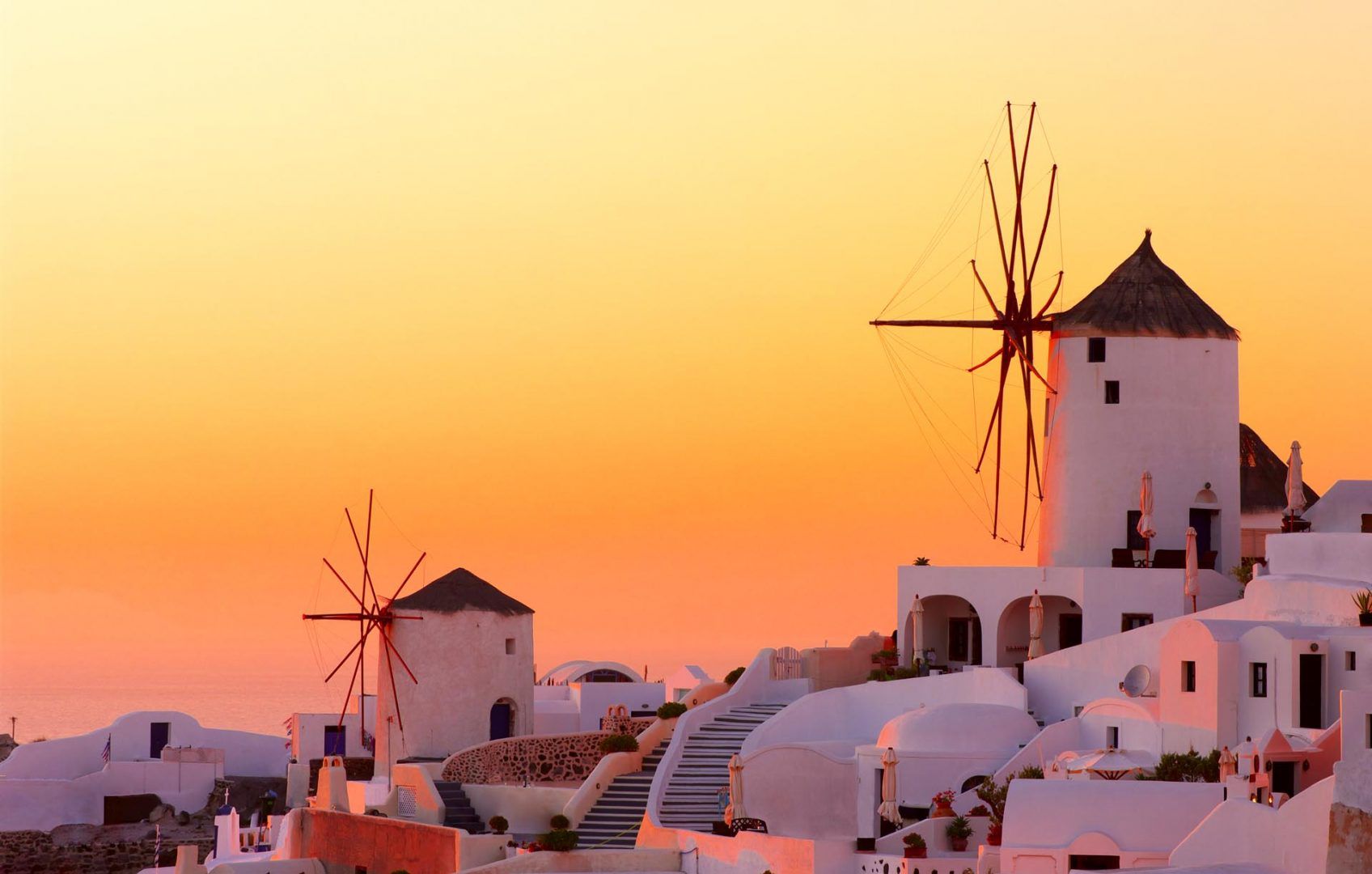
Sunset on the island of Santorini © Shutterstock
In October you will almost certainly hit a stormy spell, especially in western Greece or in the mountains. But for most of that month the “little summer of Áyios Dhimítrios” (the Greek equivalent of Indian summer) prevails, and the southerly Dodecanese and Crete are extremely pleasant.
Fewer visitors in October makes this a good opportunity to explore cultural hotspots too, such as Athens and Thessaloniki. And November sees Thessaloniki hosting its outstanding annual film festival. So this is perhaps the best month to travel to Greece to catch some of the most innovative films from around the world.
December to March are the coldest and least reliably sunny months, though even then there are many crystal-clear, fine days. The more northern regions and areas at higher altitudes endure far colder and wetter conditions, with the mountains themselves often under snow from November to May. You’ll find the mildest temperatures in winter on the island of Rhodes and southeastern Crete. In fact, Crete, with its gorgeous beaches, archaeological sites and opportunities for hiking, makes a great winter getaway.

Hiking in the White Mountains, or Lefka Ori, Crete © Shutterstock
Weather aside, out of season you will have to contend with reduced ferry and plane services to many of the islands, plus fairly skeletal facilities when you arrive. In fact, many of them go into hibernation during the winter. You will, however, find reasonable service on main routes and at least one hotel and tavern open in the port or main town of all but the tiniest isles. And larger islands, such as Crete, Corfu and Rhodes, are lively enough throughout the year. On the mainland, winter travel poses no special difficulties except, of course, in mountain villages either cut off by snow or (at weekends especially) monopolized by avid Greek skiers.
You might not expect to see the words ‘Greece’ and ‘skiing’ in the same sentence. Let’s face it, It isn’t exactly known as a premiere skiing destination. That said, Greece is a land with some mighty mountains, which, come winter, see plenty of snow and ample opportunities to ski. For example, Mt Parnassós (at Kelária and Fterólakka) draws in skiers from nearby Athens and around, while the Peloponnese offers downhill action and alpine-like beauty at Kalavryta on Mt Helmós. So, if you travel to Greece in the winter you could wander the ruins of the Acropolis in the morning, tuck into a bowl of Fasolatha at lunchtime, and be on the red runs by the afternoon.
If you’re keeping a close eye on cost, traveling off season (basically, outside the summer months) will save you money – on accommodation, eating out, even some entrance fees to museums and cultural sites. So, as long as you avoid the big national vacations, such as Christmas and Easter, this is the best time to travel to Greece for those on a budget.
Nothing brightens winter gloom like carnival (apokries). Kicking off before the first day of Lent, preceding Easter, celebrations in Patra on the Peloponnese are the most exuberant. The boúles, or masked dances, at Náoussa in Macedonia, and the outlandish goat dance on the island of Skýros are also worth seeing. The Ionian islands also do carnival well, and Athenians celebrate by going around hitting each other on the head with plastic hammers.
Whether you’re a newbie or a fully-fledged skipper, sailing the waters around Greece and its islands is a dream – and a great way to explore the myriad tucked away coves and beaches.
Unsurprisingly, if you avoid high summer, beaches and ports will be less busy, with fewer cruise ships to spoil your idyll. Seas tend to be calm around the Ionian Islands, Sporades and Halkidiki (Halkidhiki), which is definitely an advantage if you’re new to sailing, or if you’re likely to get seasick. With the wild meltemi winds hitting the southern Aegean and the Cyclades during the summer months, sailing these waters is not for the novice sailor or the faint hearted.
So, if you want to sail and are wondering when is the best time to go to Greece, springtime showcases the islands at their greenest. But if you want to swim as well as sail, wait until September when the sea is warmer.
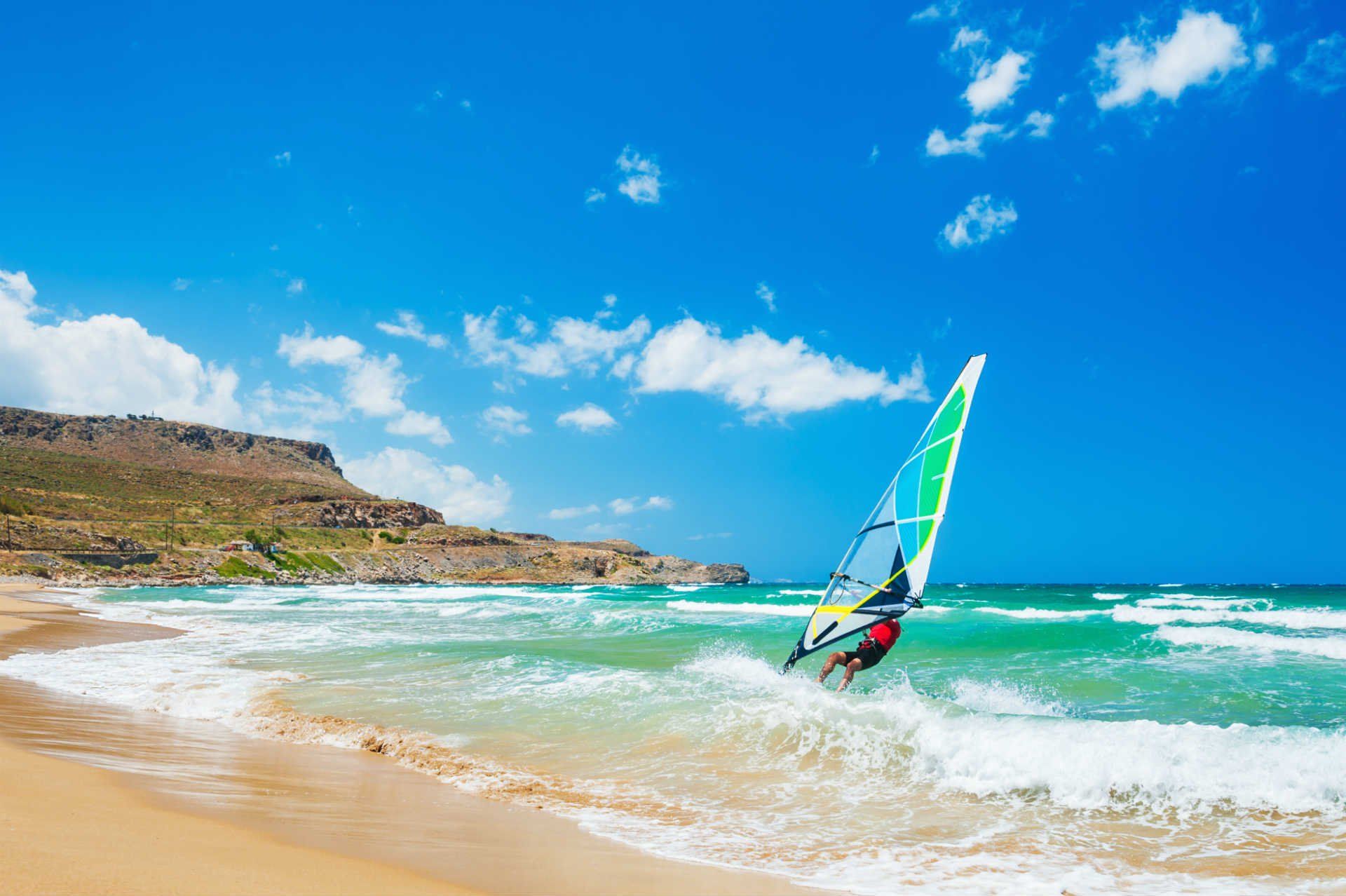
Windsurfing the waters of Crete © Shuttterstock
Most of the big Greek popular festivals have a religious basis, so they’re observed in line with the Orthodox calendar. This means that Easter, for example, the most important festival of the year, can fall as much as three weeks to either side of the Western festival. With its lavish feasts, celebrations and religious ceremonies, it's a fantastic time to be in Greece. It is busy, however, so book ahead.
On top of the main religious festivals, there are scores of local festivities, or paniyíria, celebrating the patron saint of the village church. With some 330-odd possible saints’ days you’re unlikely to travel round for long without stumbling on one of them.
More important than your actual birthday, is the “Name Day” of the saint who bears your name. The big name day celebrations (Iannis/Ianna on January 7 or Yioryios on April 23 for example) can involve thousands of people. If your name isn’t covered, no problem – your party is on All Saints’ Day, eight weeks after Easter.
Please note that the current coronavirus situation means some events may be postponed or cancelled. Check individual events before reservation your trip.
Throughout the summer you’ll find festivals of music, dance and theater at venues across Greece, with many of the events taking place at atmospheric outdoor venues. Some, in the resorts and islands, are unashamedly aimed at drawing tourists, others more seriously artistic. The granddaddy of them all is the Athens and Epiduarus Festival, which has been running every summer for over fifty years, incorporating everything from open-air performances of Classical drama in ancient theaters to jazz and contemporary art. Others include:
Kalamáta Dance Festival: July
Olympus Festival: Dhíon, Mt Olympus; July–Aug
Pátra International Festival: July–Sept
Philippi Festival: Thássos; July–Aug
Jan 1: New Year’s Day (Protokhroniá) In Greece this is the feast day of Áyios Vassílios (St Basil).
Jan 6: Epiphany (Theofánia/Tón Fóton) Marks the baptism of Jesus as well as the end of the twelve days of Christmas.
Carnival (Apokriátika) Festivities span three weeks, climaxing during the seventh weekend before Easter. Pátra Carnival, with a chariot parade and costume parties, is one of the largest and most outrageous in the Mediterranean. Interesting, too, are the boúles or masked revels which take place around Macedonia (particularly at Náoussa), Thrace (Xánthi), and the outrageous Goat Dance on Skýros in the Sporades. The Ionian islands, especially Kefaloniá, are also good for carnival, as is Ayiássos on Lésvos.
Clean Monday (Kathará Dheftéra) The day after Carnival ends and the first day of Lent, 48 days before Easter, marks the start of fasting and is traditionally spent picnicking and flying kites.
March 25: Independence Day and the feast of the Annunciation (Evangelismós) Both a religious and a national vacation. Military parades and dancing celebrate the beginning of the revolt against Ottoman rule in 1821, and church services honor the news given to Mary that she was to become the Mother of Christ. There are major festivities on Tínos, Ýdhra and any locality with a monastery or church named Evangelístria or Evangelismós.
Easter (Páskha):The most important festival of the Greek year. The island of Ýdhra, with its alleged 360 churches and monasteries, is the prime Easter resort; other famous Easter celebrations are held at Corfu, Pyrgí on Híos, Ólymbos on Kárpathos and St John’s monastery on Pátmos. Good Friday and Easter Monday are also public vacations.
April 23: The feast of St George (Áyios Yeóryios) St George, the patron of shepherds, is honoured with a big rural celebration, with feasting and dancing at shrines and towns. If it falls during Lent, festivities are postponed until the Monday after Easter.
May 1: May Day (Protomayiá) The great urban vacation when townspeople traditionally make for the countryside to picnic and fly kites, returning with bunches of wild flowers. Wreaths are hung on their doorways or balconies. There are also large demonstrations by the Left for Labor Day.
Whit Monday (Áyio Pnévma) Fifty days after Easter, sees services to commemorate the descent of the Holy Spirit to the assembled disciples. Many young Greeks take advantage of the long weekend, marking the start of summer, to head for the islands.
June 29 & 30: SS Peter and Paul (Áyios Pétros and Áyios Pávlos) The joint feast of two of the more widely celebrated name days
July: Ippokrateia Festival; Kos
July: Réthymnon Wine Festival
July 17: Feast of St Margaret (Ayía Marína) A big event in rural areas, as she’s an important protector of crops.
July 20: Feast of the Prophet Elijah (Profítis Ilías) Widely celebrated at the countless hilltop shrines of Profítis Ilías. The most famous is on Mount Taïyetos, near Spárti, with an overnight vigil.
July–Aug: Sáni Jazz Festival; Halkidhikí
Aug: Lefkádha Arts and Folklore festivals
Aug 6: Transfiguration of the Savior (Metamórfosis toú Sotíros) Another excuse for celebrations, particularly at Khristós Ráhon village on Ikaría, and at Plátanos on Léros. On Hálki the date is marked by messy food fights with flour, eggs and squid ink.
Aug 15: Assumption of the Blessed Virgin Mary (Apokímisis tís Panayías) This is the day when people traditionally return to their home village, and the heart of the vacation season, so in many places there will be no accommodation available on any terms. Even some Greeks will resort to sleeping in the streets at the great pilgrimage to Tínos; also major festivities at Páros, at Ayiássos on Lésvos, and at Ólymbos on Kárpathos.
Aug 29: Beheading of John the Baptist (Apokefálisis toú Prodhrómou) Popular pilgrimages and celebrations at Vrykoúnda on Kárpathos.
Sept 14: Exaltation of the Cross (Ípsosis toú Stavroú) A last major summer festival, keenly observed on Hálki.
Sept 24: Feast of St John the Divine (Áyios Ioánnis Theológos) Observed on Níssyros and Pátmos, where at the saint’s monastery there are solemn, beautiful liturgies the night before and early in the morning.
Oct 28: Óhi Day A national vacation with parades, folk dancing and speeches to commemorate prime minister Metaxas’ one-word reply to Mussolini’s 1940 ultimatum: Ohi! (“No!”).
Dec 6: Feast of St Nicholas (Áyios Nikólaos)
Dec 25 & 26: Christmas (Khristoúyenna) If less all-encompassing than Greek Easter, Christmas is still an important religious feast, one that increasingly comes with all the usual commercial trappings: decorations, gifts and alarming outbreaks of plastic Santas on rooftops.
Dec 31: New Year’s Eve (Paramoní Protohroniá)
From travel safety to visa requirements, discover the best tips for visiting Greece
Discover Greece's most captivating stories
written by
Rough Guides Editors
updated 15.05.2025
For over 40 years, Rough Guides has been a trusted name in travel, offering expert-curated guides, inspiring articles, and tailor-made trips. Our passionate team of writers and local travel specialists provide in-depth insights into destinations worldwide, from iconic landmarks to hidden gems. We help you travel smarter and experience the world authentically.